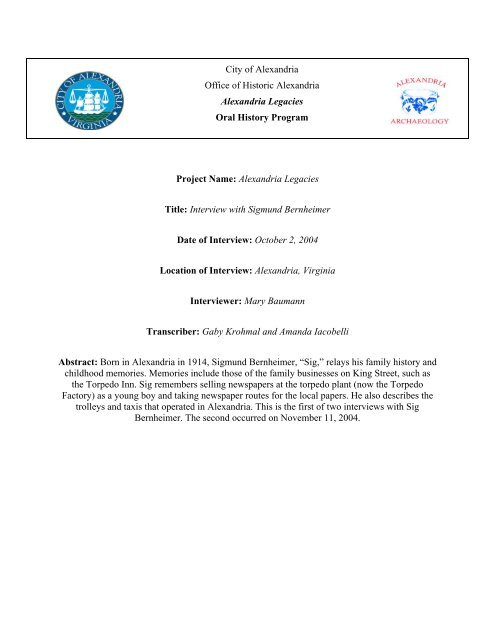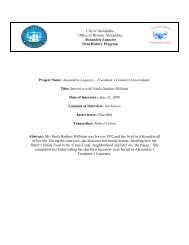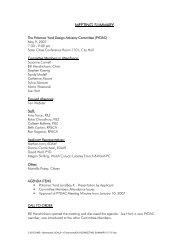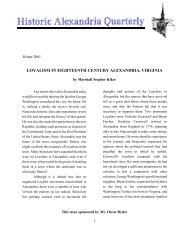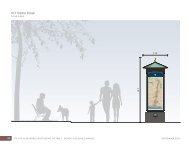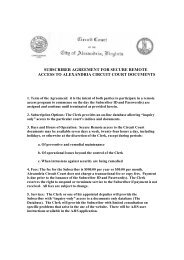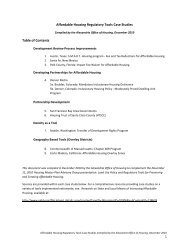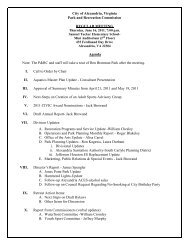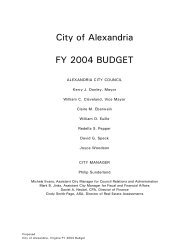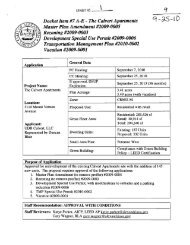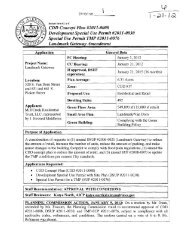October 2004 Interview - City of Alexandria
October 2004 Interview - City of Alexandria
October 2004 Interview - City of Alexandria
You also want an ePaper? Increase the reach of your titles
YUMPU automatically turns print PDFs into web optimized ePapers that Google loves.
<strong>City</strong> <strong>of</strong> <strong>Alexandria</strong><br />
Office <strong>of</strong> Historic <strong>Alexandria</strong><br />
<strong>Alexandria</strong> Legacies<br />
Oral History Program<br />
Project Name: <strong>Alexandria</strong> Legacies<br />
Title: <strong>Interview</strong> with Sigmund Bernheimer<br />
Date <strong>of</strong> <strong>Interview</strong>: <strong>October</strong> 2, <strong>2004</strong><br />
Location <strong>of</strong> <strong>Interview</strong>: <strong>Alexandria</strong>, Virginia<br />
<strong>Interview</strong>er: Mary Baumann<br />
Transcriber: Gaby Krohmal and Amanda Iacobelli<br />
Abstract: Born in <strong>Alexandria</strong> in 1914, Sigmund Bernheimer, “Sig,” relays his family history and<br />
childhood memories. Memories include those <strong>of</strong> the family businesses on King Street, such as<br />
the Torpedo Inn. Sig remembers selling newspapers at the torpedo plant (now the Torpedo<br />
Factory) as a young boy and taking newspaper routes for the local papers. He also describes the<br />
trolleys and taxis that operated in <strong>Alexandria</strong>. This is the first <strong>of</strong> two interviews with Sig<br />
Bernheimer. The second occurred on November 11, <strong>2004</strong>.
<strong>Interview</strong> with Sigmund Bernheimer, <strong>October</strong> 2, <strong>2004</strong> Page 2 <strong>of</strong> 26<br />
Table <strong>of</strong> Contents<br />
Tape: Tape 1<br />
Side: Side 1<br />
Minute Counter Page Topic<br />
Not Not 3 Introductions<br />
indicated indicated<br />
4 Family History<br />
5 Childhood Memories: Businesses and Industries<br />
9 The Family Business<br />
12 Child’s Play<br />
Tape: Tape 1<br />
Side: Side 2<br />
Minute Counter Page Topic<br />
Not Not 13 Claim to Fame<br />
indicated indicated<br />
14 Education<br />
16 Life in the Home<br />
18 Childhood Working Experience<br />
20 Childhood Memories<br />
21 Childhood Working Experience 2<br />
21 The Streetcar and Entertainment<br />
23 Adult Working Experience<br />
24 Transportation<br />
24 Marriage<br />
25 The Civil War Veteran
<strong>Interview</strong> with Sigmund Bernheimer, <strong>October</strong> 2, <strong>2004</strong> Page 3 <strong>of</strong> 26<br />
INTRODUCTIONS<br />
Sig Bernheimer, <strong>2004</strong><br />
Mary Baumann: Today is Saturday <strong>October</strong> 2, <strong>2004</strong>. My name is Mary Baumann, and today<br />
I am interviewing Sig Bernheimer at his home on South Lee Street. Sig, can<br />
you please give us your name? Just your name.<br />
Sig Bernheimer: My name is Sigmund Stern Bernheimer.<br />
MB: What is your address?<br />
Sig Bernheimer: 117 South Lee Street <strong>Alexandria</strong>, Virginia 22314.<br />
MB: And your date <strong>of</strong> birth?<br />
Sig Bernheimer: July 10, 1914.<br />
MB: Can you also give us the names <strong>of</strong> your parents?<br />
Sig Bernheimer: My father was Jona Bernheimer. My mother was Martha Bernheimer.<br />
MB: And what was your mother’s maiden name?<br />
Sig Bernheimer: Her maiden name was Martha Stern.<br />
MB: Martha Stern. Okay. And did you have any brothers or sisters?<br />
Sig Bernheimer: I had two brothers. Samuel the older, was a…he passed away in 1999. He<br />
was in real estate with Bob Duncan. And he quitted a branding operation,<br />
Bob was the politician. Norman became a lawyer, and he passed away in<br />
2000.<br />
MB: So, two brothers?
<strong>Interview</strong> with Sigmund Bernheimer, <strong>October</strong> 2, <strong>2004</strong> Page 4 <strong>of</strong> 26<br />
Sig Bernheimer: Two brothers.<br />
MB: And how about your wife? You were married for…<br />
Sig Bernheimer: We were married 1938. We were married 57 years. She died December 20,<br />
1995.<br />
MB: And what was her name?<br />
Sig Bernheimer: Doris Bernheimer.<br />
MB: Do you have any children?<br />
Sig Bernheimer: I have two children. Carol Hammond and Jon Bernheimer.<br />
MB: And then do you remember…where any <strong>of</strong> your children were born…were<br />
they also born in <strong>Alexandria</strong>, or—<br />
Sig Bernheimer: Carol was born in <strong>Alexandria</strong>. Actually, she was born in Walter Reed<br />
Hospital. We were living at 800 South Washington Street. And she was<br />
born in [19]43. She was 60 this year, so that was this year…so she was born<br />
in [19]44…<br />
MB: She was 60 this year, so [incomprehensible] it was [19]44. Okay.<br />
Sig Bernheimer: And Jon was born in [19]47. Jon is J-O-N. My father was Jona, and he took<br />
a beating all the time for that name.<br />
MB: So you dropped the “h.” [laughing]<br />
Sig Bernheimer: Dropped the “h” and its Jon. Jon, he works for Montgomery County, in<br />
Maryland.<br />
MB: And what year was he born?<br />
Sig Bernheimer: He was born in [19]47.<br />
MB: Okay. So we’ve gotten that basic information out <strong>of</strong> the way.<br />
FAMILY HISTORY<br />
MB: And you were born here in <strong>Alexandria</strong>, Virginia?<br />
Sig Bernheimer: Right.<br />
MB: So you’ve lived here <strong>of</strong>f and on your whole life?<br />
Sig Bernheimer: Right.<br />
MB: Now let’s start with your family and when they came to this area. And<br />
we’ll, we’ll move from there.<br />
Sig Bernheimer: My grandfather, Samuel Bernheimer, came from Germany in 1837, and<br />
settled here in <strong>Alexandria</strong>. We had relatives…here in <strong>Alexandria</strong> we had<br />
relatives and in Philadelphia. We had two <strong>of</strong> them…two relatives
<strong>Interview</strong> with Sigmund Bernheimer, <strong>October</strong> 2, <strong>2004</strong> Page 5 <strong>of</strong> 26<br />
introduced my father and mother, and they were married in 1910. Samuel<br />
was born in 1912, I was born in 1914, and the lawyer, Norman, was born in<br />
1916.<br />
MB: And what do you know about the family, in the area, before you were born?<br />
Sig Bernheimer: Well, let’s see, Grandfather came over from Germany and settled here. He<br />
opened a store down on King and Lee Street, 1840s. He died in 1988. Had<br />
gotten…<br />
MB: 1888?<br />
Sig Bernheimer: 1888…<br />
MB: Okay.<br />
Sig Bernheimer: Customer buying a gun, at the store, he had pulled the trigger and it must<br />
have been…there was a bullet in there…<br />
MB: …Oh.<br />
Sig Bernheimer: …so he took about seven months, they solved with penicillin and he<br />
survived.<br />
MB: Right.<br />
Sig Bernheimer: But he died in 1888.<br />
MB: So what type <strong>of</strong> shop was it?<br />
Sig Bernheimer: Ah, there was…Oh, on the first floor men’s clothing and that, that was the<br />
harness-making machine that they added to the back <strong>of</strong> the store…and even<br />
in my time. I think they closed that down about 1926. It made saddles,<br />
bridles, and reins, there in the store. The second, third, and fourth floor there<br />
was furniture. And uh…[incomprehensible] Father died in 1828 [1928],<br />
mother ran the business until [19]31. At that point she closed it and opened<br />
a new…dress shop at King [Street] and Patrick Street in 1932 or [19]33.<br />
MB: So up until 1931 your family had a shop at, what is now, the Why Not?<br />
Shop, on King Street?<br />
Sig Bernheimer: Yeah…at King [Street] and Lee [Street].<br />
CHILDHOOD MEMORIES: BUSINESSES AND INDUSTRIES<br />
MB: King [Street] and Lee [Street]. Okay…interesting. And now, so did you<br />
spend a lot <strong>of</strong> time in that shop down there, as you were growing up?<br />
Sig Bernheimer: Yeah. I like to say my young years. I still am…[unintelligible] there was a<br />
cash drawer a nickel or a dime [laughs].<br />
MB: And what did you do with the money?<br />
Sig Bernheimer: I’d go to the candy store. [laughs] Oh by the way, on the uh…history along<br />
that side. George Washington…there was a drugstore at King [Street] and
<strong>Interview</strong> with Sigmund Bernheimer, <strong>October</strong> 2, <strong>2004</strong> Page 6 <strong>of</strong> 26<br />
Fairfax Street. And George Washington ordered castor oil for Mount<br />
Vernon, a gallon, imagine, for the animals. But that was…in my time<br />
Leadbeater at the drugstore. There was a drugstore at almost every corner<br />
on King Street. Crayton was at King [Street] and Royal [Street]. Forefield<br />
was King [Street] and Pitt [Street], Timberland’s [was at] King [Street] and<br />
Washington Street. There was Copper’s drugstore at Columbus Street.<br />
Gibson’s at Alfred Street. And, there was two [unintelligible] more had<br />
been drugstores in…[unintelligible] theater.<br />
MB: That’s quite a few drugstores.<br />
Sig Bernheimer: There were about 20 drugstores almost in a row.<br />
MB: Oh, interesting. What were the other businesses on the street at this time?<br />
Sig Bernheimer: There were, let’s see, Ready to Wear, [unintelligible] Ezrin, and just <strong>of</strong>f<br />
<strong>of</strong>…King [Street] and Washington [Street].<br />
MB: What was the name?<br />
Sig Bernheimer: Ezrin.<br />
MB: Ezrin—<br />
Sig Bernheimer: And then he went in to real estate later…now let’s see…Woolworth had the<br />
store where Murphy’s is now, at King [Street] and Washington Street.<br />
People named Smith owned the building. There were three stores on King<br />
Street: a Greek Restaurant at King [Street] and Washington [Street],<br />
pointing toward the river, Sanitary Grocery Company, and then another<br />
Greek restaurant. And the Smith family owned the building. Upstairs were<br />
the twenty one-room <strong>of</strong>fices. And, they sold…there was a Smith daughter,<br />
who, at that time, used to walk around <strong>Alexandria</strong> with a paper carrying<br />
bag, with twenty thousand dollars, twenty-five thousand, thirty thousand<br />
dollars. She didn’t really like banks. And nobody ever [incomprehensible]<br />
and took the money.<br />
MB: Oh my goodness.<br />
Sig Bernheimer: But there was half a dozen men’s clothing stores up and down King Street.<br />
MB: When you were a boy?<br />
Sig Bernheimer: Growing up.<br />
MB: When you were growing up.<br />
Sig Bernheimer: So in the…the <strong>Alexandria</strong> Gazette was in the 300 block King Street. And<br />
the um…you know where the fountain is now? And <strong>City</strong> Hall, where the<br />
clock…they had shops in there. I shouldn’t tell you this one, I won’t really<br />
mean it.<br />
MB: Okay.
<strong>Interview</strong> with Sigmund Bernheimer, <strong>October</strong> 2, <strong>2004</strong> Page 7 <strong>of</strong> 26<br />
Sig Bernheimer: There were five or six…Shuman’s bakery was in there, Johnson’s meat<br />
market was in there, with three or four <strong>of</strong> us…no doors, no walls, the one<br />
shopping to the other.<br />
MB: Like a market.<br />
Sig Bernheimer: …the store employee. Oh, and they closed up at night. There was a key in<br />
the side door and they turned the key and had it at the police station. One<br />
time Shauncy had a roast ready for next-day delivery. When he looked for<br />
it, he couldn’t find it. They…would that we played a…something…truck<br />
one-night delivery the next day, it was taken. After that, we decided to leave<br />
someone on the premises when the market closed. So, a couple nights later,<br />
someone came in after everything was closed up; put the key in the hole and<br />
opened the door and went through with a flashlight, picking up the bakery<br />
and this that and the other. They turned the lights on, at a very, very high<br />
city employee. He had a [unintelligible] girlfriend in town…when he went<br />
to the grocery store and he was buying groceries for his girlfriend, the two<br />
may have caught up with him. And so rather than taking a chance on being<br />
caught, he got caught [laughs]…<br />
MB: Yeah, he sure did. Can you tell me what year that happened?<br />
Sig Bernheimer: It was in 1926 or 1927. Somewhere in there.<br />
MB: And what was the location again, <strong>of</strong> the…<br />
Sig Bernheimer: <strong>City</strong> Hall.<br />
MB: …the market…<br />
Sig Bernheimer: The markets were first <strong>of</strong> all at <strong>City</strong> Hall. Now on the outside where they<br />
have the sweet country markets, Saturdays now…the farmers used to bring<br />
stuff in there, in the open markets, outside.<br />
MB: Well that’s great, though…<br />
Sig Bernheimer: [unintelligible]…In 1750, George Washington, Lafayette, and General<br />
Braddock [unintelligible] British troops over here…<strong>Alexandria</strong> was a<br />
British possession and those three were [unintelligible] British troops that<br />
marched from <strong>Alexandria</strong> to Fort McCord up in Pittsburgh. But those three<br />
units <strong>of</strong> troops—and they left <strong>Alexandria</strong> with a cannon—road up Braddock<br />
Road to 350 miles to Pittsburgh to fight in the French and Indian War, the<br />
British during this war fought the French and Indians.<br />
MB: Uh huh, interesting…<br />
Sig Bernheimer: But George Washington, Lafayette, and General Braddock moved the<br />
British troops. [unintelligible sentence].<br />
MB: So you remembered a bunch <strong>of</strong> businesses on the street, as a boy…do you<br />
remember a lot <strong>of</strong> industry in the area or—
<strong>Interview</strong> with Sigmund Bernheimer, <strong>October</strong> 2, <strong>2004</strong> Page 8 <strong>of</strong> 26<br />
Sig Bernheimer: No. There was…Potomac Yards on Monroe Avenue. You cross the bridge<br />
to get to Monroe Avenue. Ah…[unintelligible]...the industries in that…the<br />
industries that we had built…Arthur Brian had a place on 100 block <strong>of</strong> King<br />
Street manufacturing fertilizer, that type <strong>of</strong> thing. He brought oyster shells<br />
up from the Eastern Shore Chesapeake Bay area and the plant was on the<br />
side <strong>of</strong> Lee Street [unintelligible] in the 500 block, and in the summertime<br />
the fumes from that place were terrible.<br />
MB: Really?<br />
Sig Bernheimer: And I’ll give you another one. …across the street, the ice house was there<br />
[unintelligible] on Monroe Avenue, which is across the Duncan Bridge.<br />
They manufactured ice just on the <strong>Alexandria</strong> side <strong>of</strong> the bridge, and there<br />
were some…oh, half a dozen places around the city where they sold ice—<br />
refrigerators weren’t in yet. Now across the street from the [unintelligible]<br />
ice company, they had a place down on Cameron Street on the river. They<br />
closed that up. They built this building across the street and there used to be<br />
about twenty ice wagons with about forty new [unintelligible] storage<br />
behind the building just <strong>of</strong>f <strong>of</strong> [?] Street there.<br />
In the summertime, when I was a kid, kid growing up, 8, 9, 10 years old,<br />
every summer the [unintelligible] would get loose and go charging up and<br />
down Lee Street, and the kids would try to stop him and got knocked down<br />
[both laugh]. But…oh there was a [unintelligible] square with an arrow on<br />
it, twenty-five, thirty-five, forty-five, fifty, the ice wagon they hooked up<br />
two [unintelligible] in the ice wagon and go around the city. And the people<br />
had to sort <strong>of</strong> look down at this thing up from a window, at thirty five it cut<br />
ice [unintelligible] three hundred pounds blocks <strong>of</strong> ice and then cut a thirty<br />
five pound piece [unintelligible].<br />
MB: Oh, okay, so they had a system to know what…<br />
Sig Bernheimer: They could actually find out what they wanted.<br />
MB: …what you wanted, that’s very interesting.<br />
Sig Bernheimer: [unintelligible] ice almost every day. People had the ice [unintelligible]<br />
refrigerator. Refrigerators came in about…oh about 1925, [192]6 or [192]7,<br />
before then people had to pick up ice from the…<br />
MB: So do you remember that being a big help to have the refrigerator available<br />
to you?<br />
Sig Bernheimer: With the refrigerator you didn’t need ice anymore.<br />
MB: Was it a big change then?<br />
Sig Bernheimer: Oh yeah, yeah. Because we had to get a 6-pound bucket <strong>of</strong> ice, about every<br />
other day.<br />
MB: Every other day…
<strong>Interview</strong> with Sigmund Bernheimer, <strong>October</strong> 2, <strong>2004</strong> Page 9 <strong>of</strong> 26<br />
Sig Bernheimer: [unintelligible] protected [unintelligible].<br />
MB: What about the torpedo factory over there? When did that…<br />
Sig Bernheimer: That was put up about 1915 or [19]16. And it manufactured torpedoes until<br />
about 1924, 1925. I went to work in the small building that’s there now.<br />
That was the shipping department.<br />
MB: And there was another building that was…<br />
Sig Bernheimer: On Lee Street down to the…was the manufacturing, on Cameron Street<br />
[unintelligible]. There was a [unintelligible] steel lumber yard that was there<br />
before the torpedo plant went up, I remember that [unintelligible] 19…, I’d<br />
say 19[?] [unintelligible]. But Brian [?] had the manufacturing plant for the<br />
crowbars[?] from 100 block North [?] [Street]. The other industry Ford, oh<br />
this was real late, 1940, [19]45, Ford Motor Company put the<br />
[unintelligible] down there, and assembled cars there, [unintelligible] and<br />
then the torpedo plant was all the way down [unintelligible] built ships<br />
there, after the World War I they brought ships down to be dismantled.<br />
There used to be a fire in <strong>Alexandria</strong> every Saturday night [unintelligible] I<br />
think they just, you know, burned them, you know [unintelligible].<br />
THE FAMILY BUSINESS<br />
MB: I want to go back to the store that your parents owned. Did you work when<br />
you were a kid there, or…?<br />
Sig Bernheimer: Not work, no… Actually, …when I was in there I may have helped a couple<br />
<strong>of</strong> customers out, but not full-time. They opened the store in 1840.<br />
Grandfather died in 1888. Father was born in 1870. He took over, I guess,<br />
by [18]88, after his father was shot. And he died in 1928. Mother ran it for<br />
three years, and then she sold it. You know, I’ve got pictures in this thing.<br />
They owned three other buildings on King Street, 200 [unintelligible] 1840,<br />
World War I there was a Torpedo Inn, sandwiches, c<strong>of</strong>fee, that type, for the<br />
torpedo workers. The third building was [unintelligible] had a pickup for<br />
packages for the whole city <strong>of</strong> <strong>Alexandria</strong> and, when my father died in<br />
[19]28, Mother closed the stores in [19]31 and sold all the three buildings<br />
for twelve thousand dollars, four thousand a building, all <strong>of</strong> them a million<br />
and a half going.<br />
MB: Oh…[laughing] Wow! And, I’m sorry, did you say where the buildings<br />
were located? Where was the Torpedo Inn?<br />
Sig Bernheimer: 200 King Street.<br />
MB: 200 King Street.<br />
Sig Bernheimer: The [Tory place] was 202 and the next one was 204…<br />
MB: They were all…
<strong>Interview</strong> with Sigmund Bernheimer, <strong>October</strong> 2, <strong>2004</strong> Page 10 <strong>of</strong> 26<br />
Sig Bernheimer: And 206. Yeah, three buildings [unintelligible].<br />
MB: Right, ok. What do you remember about the store and what was in the store?<br />
Sig Bernheimer: The first floor everything was men’s, shoes and boots. And then, the second<br />
row <strong>of</strong> columns was men’s pants, shirts, and at the back <strong>of</strong> [unintelligible]<br />
harness-making machine, and then [unintelligible] the second, third, and<br />
fourth floors were furniture.<br />
MB: Uh-huh. And your family went into there in 18—?<br />
Sig Bernheimer: 1840.<br />
MB: [18]40.<br />
Sig Bernheimer: Grandfather…<br />
MB: …Do you know anything about that building before they were there?<br />
Sig Bernheimer: No.<br />
MB: No.<br />
Sig Bernheimer: Oh, you mean before father had it.<br />
MB: Right.<br />
Sig Bernheimer: No, I don’t remember that at all. You see Grandfather died in the 1880s.<br />
Father…Well, Grandfather bought this thing, this is not old. Next door was<br />
1700s probably. George Washington was [unintelligible].<br />
MB: Yeah.<br />
Sig Bernheimer: But this one my Grandfather made in 1859. So, Father was born here.<br />
MB: Uh-huh. …Pam told me a story about something that you found in the<br />
attic…some metal, scrap metal.<br />
Sig Bernheimer: Oh yeah…right.<br />
MB: Tell me that story.<br />
Sig Bernheimer: Back then it was a four-story building…<br />
MB: This is the ‘Why Not?’ shop?<br />
Sig Bernheimer: In the Civil War, <strong>Alexandria</strong> was occupied by Union troops. They took the<br />
store away from the family, 1861 to 1865. And, for the family to get it back<br />
after the Civil War, and I’m suing for that grant. [unintelligible].<br />
MB: Oh, you are? [laughing] For four years, right?<br />
Sig Bernheimer: Before the fourth-floor ceiling and the ro<strong>of</strong>, there’s about a four-foot<br />
crawling space up there. And there were iron [gibbs?] [unintelligible<br />
sentence fragment] stealing the stuff out <strong>of</strong> the store without anyone
<strong>Interview</strong> with Sigmund Bernheimer, <strong>October</strong> 2, <strong>2004</strong> Page 11 <strong>of</strong> 26<br />
knowing it [unintelligible]…<br />
MB: Without your parents knowing?<br />
Sig Bernheimer: …Yeah, and I’d take it down to this junk shop that was at Prince [Street]<br />
and Union Street, iron was probably ten cents to a hundred pounds,<br />
whatever, people [unintelligible]. I’m almost sure my grandmother, my,<br />
let’s see…yeah, grandmother was probably [unintelligible] and<br />
[unintelligible] from Philadelphia introduced her to my father, to<br />
[unintelligible]. But that was the Civil War [gibbs?] they were stored up<br />
between these fourth floor ceiling and the ro<strong>of</strong>, and pigeons, oh, there was<br />
open windows on the fourth floor, and pigeons would fly in and what not, in<br />
which case we’d get a [unintelligible] and you know, close, but those Civil<br />
War [gibbs?]…<br />
.MB: That must have been hard to get those out <strong>of</strong> there without anyone noticing.<br />
How old were you?<br />
Sig Bernheimer: Oh, I’d say probably 11, 12, 13 or so.<br />
MB: Did you have any accomplices? Any <strong>of</strong> your friends helping you out or<br />
anything?<br />
Sig Bernheimer: Nope.<br />
MB: You did it all by yourself? [laughing]<br />
Sig Bernheimer: Yeah…let’s see I went in the store…Oh, they, up there on the, with the iron<br />
[gibbs?] I found brooms, there were twelve, they were a bundle, tied<br />
together. They looked like a broom that a witch would wear and, a witch<br />
would fly with, and I got one out, took it up to the [unintelligible] store<br />
between [east <strong>of</strong>?] King Street and Fairfax [Street] was a [blot?] and<br />
barbershop behind there, [Melvin?] had an antique shop. And, this round<br />
broom [unintelligible] and they took a [unintelligible] and started separating<br />
the straws, it was a straw room, that type <strong>of</strong> thing. I found that broom up<br />
there, I took it up to the antique shop-- by the way the shop was at King and<br />
[U?] Street, where the oldest building in town, at King and Fairfax.<br />
MB: Okay.<br />
Sig Bernheimer: And, I showed it to the owner. “What’s this?” “It’s just an old broom”,<br />
[unintelligible]. “You stole it down at Mount Vernon,” that was his story<br />
[laughs]. It was just an old broom. [unintelligible] “I’ll give you a quarter<br />
for it.” I did, I took the quarter, and [unintelligible] in <strong>Alexandria</strong> going in<br />
there buying [unintelligible] was selling them for fifty, seventy-five, to a<br />
hundred dollars. His story was that one <strong>of</strong> the workmen down at Mount<br />
Vernon, [unintelligible] American Revolution and [unintelligible] Mount<br />
Vernon at that time and remodeling, so this son <strong>of</strong> a gun was using the story<br />
that this was down in Mount Vernon…<br />
MB: That’s where the broom had originated from…[unintelligible] So, you had
<strong>Interview</strong> with Sigmund Bernheimer, <strong>October</strong> 2, <strong>2004</strong> Page 12 <strong>of</strong> 26<br />
just taken one <strong>of</strong> the brooms, not all <strong>of</strong> them?<br />
Sig Bernheimer: No, I took all <strong>of</strong> them.<br />
MB: You took them all, and sold them all?<br />
Sig Bernheimer: [unintelligible] they were wrapped up in a veil, so I cut the strings, got them<br />
out one at a time.<br />
MB: So, he obviously knew they were old, and he could pass them <strong>of</strong>f as George<br />
Washington’s? [laughing] Oh…that’s a funny story too.<br />
Sig Bernheimer: It is.<br />
CHILD’S PLAY<br />
MB: …Well, let’s talk about being a boy, in the city. And tell me what you and<br />
your friends would do for, you know, playing, and tell me a little about<br />
school.<br />
Sig Bernheimer: Well, as a kid we swam across the Potomac River, four <strong>of</strong> us, and the boat<br />
came on with us, one boy climbed in the boat, the other three swam over<br />
and back.<br />
MB: You made it the whole day?<br />
Sig Bernheimer: Yeah, well we rested.<br />
MB: How old were you?<br />
Sig Bernheimer: We were about oh…twelve, ten or twelve, ten, eleven, twelve.<br />
MB: The person who was in the boat - was that also one <strong>of</strong> your friends or…<br />
Sig Bernheimer: [unintelligible]<br />
MB: …an older person?<br />
Sig Bernheimer: Yeah, a [unintelligible] woman.<br />
MB: Oh, okay.<br />
Sig Bernheimer: It’s the only time [unintelligible] doing, so I better go along with you.<br />
MB: What else do you remember about games that you would play with your<br />
friends? Did you play in the streets or did you…<br />
Sig Bernheimer: We played in the streets. [unintelligible] we had a semi-pro football team, in<br />
Virginia. In September they’d start practicing under the light [unintelligible]<br />
couple teams from Washington, around the area.<br />
MB: And how old were you?<br />
Sig Bernheimer: [unintelligible]<br />
MB: All <strong>of</strong> your life…
<strong>Interview</strong> with Sigmund Bernheimer, <strong>October</strong> 2, <strong>2004</strong> Page 13 <strong>of</strong> 26<br />
Sig Bernheimer: Ya. [unintelligible] were playing there in 1910, 1914, whatever. And then<br />
they stopped eventually once they got to 1920, 1925.<br />
MB: Do you remember the names <strong>of</strong> some <strong>of</strong> your boyhood friends?<br />
Sig Bernheimer: Oh, yeah. My friend, across the street [unintelligible] my age. The Phillips,<br />
they worked for the gas company and he went to [unintelligible for a few<br />
sentences] And oh, here, George Washington [unintelligible], he had the<br />
place next door. [unintelligible] Washington owned this, it was just a piece<br />
<strong>of</strong> ground, there was no house on this back in Washington’s time, just a lot.<br />
And, let me figure this out, oh, next door here there was a one-story<br />
[unintelligible] next door a garage. In 1920 and 1921 Washington [D.C.]<br />
had a four- or five-foot snowfall, in Washington at 18 th [Street] and<br />
Columbia Road there was a [unintelligible], I think it was Knickerbocker,<br />
they had a flat ro<strong>of</strong>, with the heavy snow the ro<strong>of</strong> collapsed and killed about<br />
65 [unintelligible].<br />
MB: Oh, what a shame.<br />
Sig Bernheimer: It was the first year the…<br />
MB: The first, when it had just been built. Well, we’re getting towards the end <strong>of</strong><br />
this side <strong>of</strong> the tape so I’m gonna stop and flip it over, and then we’ll<br />
continue on your childhood. [Side 2]<br />
CLAIM TO FAME<br />
Sig Bernheimer: Friendship Fire Company on Alfred Street—George Washington gave a fire<br />
engine to the city. Marshall Beverley, who grew up with me, was vicepresident<br />
<strong>of</strong> the bank, was president <strong>of</strong> the old firehouse. And, presidents,<br />
congressmen, and astronauts [were] honorary members. John Warner, the<br />
Senator now, was there being taken in as an honorary member. Now he was<br />
married to Elizabeth Taylor at that time. When one <strong>of</strong> them was up on the<br />
platform there, for the dance, and I was standing down into the crowd, this<br />
voice says “You [unintelligible] get <strong>of</strong>f my foot!” I’d stepped on Elizabeth<br />
Taylor’s foot, moving my feet around. That’s one claim to fame.<br />
MB: Oh! That’s one <strong>of</strong> your claims to fame. Okay. What’s the other one?<br />
Sig Bernheimer: I was in Chicago for about four months, Evan Fur had half <strong>of</strong> their labor in<br />
the shop selling and cutting furs. And I went to work for them, not in the fur<br />
department, not in the cutting and union labor. CIO was pretty sure they<br />
were activated and it was Evans Fur threw out [unintelligible] and took on<br />
CIO. And the [unintelligible] were walking up and down the state street and<br />
[unintelligible] wagons there three four times a day carrying the pickets and<br />
the pikes [unintelligible]. The second and third day <strong>of</strong> the strike I walked<br />
down from 800 North to the store, it’s on the third floor. Went in the<br />
building, got on the escalator, and a guy garrisoned by the column pulls me<br />
<strong>of</strong>f and [unintelligible], I hit him and I [unintelligible]. The elevator<br />
[unintelligible] grabbed me and pulled me back in, went up to the third
<strong>Interview</strong> with Sigmund Bernheimer, <strong>October</strong> 2, <strong>2004</strong> Page 14 <strong>of</strong> 26<br />
floor, a fellow named Sam Frank came and got me, “Boy are you in<br />
trouble.” “What do you mean, about downstairs?” “Yeah, let’s go see if we<br />
can straighten it out.” The two <strong>of</strong> us went downstairs, walking toward the<br />
front door, this two-hundred-pound [unintelligible] comes at me, his fist is<br />
up like this. Frank jumped between the two <strong>of</strong> us and, “Wait, wait, wait a<br />
minute, he should not have pulled him <strong>of</strong>f the car, he should not.” We went<br />
into a restaurant right there, had c<strong>of</strong>fee and straightened it out. I was not in<br />
the union, so he shouldn’t have gotten me and pulled me out, and I should<br />
not have hit him. His name was Chicky Hadersman. He was a Capone<br />
mobster. He was up for murder three times in Chicago, and I hit him and got<br />
away with it.<br />
MB: Wow, you’re a lucky person! What year was that?<br />
Sig Bernheimer: That was, let’s see, [unintelligible] it would have been [19]33.<br />
MB: [19]33, [19]34, in Chicago.<br />
Sig Bernheimer: Yeah.<br />
MB: Well, you’re lucky to be alive I guess huh?<br />
Sig Bernheimer: We worked this Evans Fur Company monthly pay, we could bring fifteen<br />
dollars a week. You know it really was set in by Roosevelt at that time,<br />
minimum wage fourteen dollars, son <strong>of</strong> a guns cut my pay a dollar.<br />
MB: They did…<br />
Sig Bernheimer: [laughs]…yup.<br />
EDUCATION<br />
MB: Well, let’s go back to <strong>Alexandria</strong>. We’re still working on your childhood.<br />
And can you tell me about your education and school as you were growing<br />
up?<br />
Sig Bernheimer: I was a high school dropout. [unintelligible] credit at graduation and with<br />
that, because <strong>of</strong> summer school, and I didn’t go, the [principal?] was<br />
smarter than I am, I picked up a blank diploma, and the next morning when<br />
I looked at it down here, it was blank but I fixed [unintelligible] I didn’t go<br />
to school [unintelligible]. In Chicago that fur business, September, <strong>October</strong>,<br />
November, for [unintelligible] nowadays he stored almost fifty thousand<br />
coats and you know he was always coming in and going out so,<br />
[unintelligible] a year and went up to Northwestern University at a Chicago<br />
branch down in night school and it was business administration. I was doin’<br />
what they would teach. So with those hours though I dropped out <strong>of</strong><br />
Northwestern. Four years later I went to New York city at a Chicago firm’s<br />
New York <strong>of</strong>fice [unintelligible], I wanted to pick up experience to come<br />
back [unintelligible]. So, I went to Columbia University night school and<br />
with those hours I dropped out <strong>of</strong> Columbia. High School dropout, college<br />
dropout…
<strong>Interview</strong> with Sigmund Bernheimer, <strong>October</strong> 2, <strong>2004</strong> Page 15 <strong>of</strong> 26<br />
MB: But you got the experience to come back and…<br />
Sig Bernheimer: …school, school [applied?] not. The newspapers and Reader’s Digest was<br />
my education.<br />
MB: Was your education. What about primary education when you were a small<br />
boy?<br />
Sig Bernheimer: Oh, I got a picture [unintelligible] building.<br />
MB: Do you remember the name <strong>of</strong> the school?<br />
Sig Bernheimer: Yeah, we went to Washington Street, the 300 block, [unintelligible] yeah,<br />
George Washington’s building to [unintelligible], to the city <strong>of</strong> <strong>Alexandria</strong>.<br />
We had three years there <strong>of</strong> first, second, and third grade. And I remember<br />
there was one boy in class in second grade that was at least 20 years old, the<br />
teacher when I was in that class made me go outside and sit on the stairs,<br />
and he’d go outside and [unintelligible] [laughs].<br />
MB: This is when you were in first, second, and third grade.<br />
Sig Bernheimer: Yeah, first and second.<br />
MB: And so did you walk to school?<br />
Sig Bernheimer: Ya. Here’s the building.<br />
MB: This is the building?<br />
Sig Bernheimer: George Washington gave that to the city <strong>of</strong> <strong>Alexandria</strong>.<br />
MB: And is this building still here? <strong>Alexandria</strong> Academy, is that what it was<br />
called, at the time?<br />
Sig Bernheimer: Yes, yes, but it was actually a public school.<br />
MB: It was a public school.<br />
Sig Bernheimer: In those days boys were sent to a different school than girls, and I think we<br />
were in fifth grade before boys and girls, you know, were together. But<br />
there was boys only at this school, girls only at Lee School on Prince Street<br />
there, and as we went to Jefferson School up on West Street then we were<br />
together.<br />
MB: That was after fifth grade…<br />
Sig Bernheimer: …Ya.<br />
MB: …you moved to Jefferson.<br />
Sig Bernheimer: I went there for fifth, sixth, and seventh. And high school was for four years<br />
on Cameron Street.<br />
MB: What was the name <strong>of</strong> the High School?
<strong>Interview</strong> with Sigmund Bernheimer, <strong>October</strong> 2, <strong>2004</strong> Page 16 <strong>of</strong> 26<br />
Sig Bernheimer: <strong>Alexandria</strong> High School.<br />
MB: <strong>Alexandria</strong> High School.<br />
Sig Bernheimer: Jefferson School was on West Street, Lee School was the girls on Prince<br />
Street, the other was Washington Street.<br />
MB: Were you usually going, walking to school with your brothers or—<br />
Sig Bernheimer: I think no, we were all in different grades, no. We were two years difference<br />
between the oldest and uh, 1912, [19]14, and [19]16 were the years.<br />
MB: What do you remember about your teachers and…?<br />
Sig Bernheimer: I remember their names.<br />
MB: You do? Well, let’s have that information.<br />
Sig Bernheimer: Miss Woodward was principal <strong>of</strong> the Washington Street, and Miss Pratt was<br />
in, Miss Wood was second grade, Miss Pratt had the first. The first grade<br />
kids….no no, but… oh, I remember, we’d bring the teacher home for lunch<br />
sometimes. Walking from school to here, from Lee School down here.<br />
Mother did that.<br />
MB: And you would walk home with your teacher and your mother prepared<br />
lunch?<br />
Sig Bernheimer: Yeah, we had lunch then came back at the school by ourselves.<br />
MB: So did you do that because you lived close by and the teacher could come<br />
and eat with you or—<br />
Sig Bernheimer: Well, maybe I’d say its eight or ten blocks between the [unintelligible] and<br />
fourth grade…but no the teacher would come to lunch and go back to<br />
school.<br />
MB: Oh, that’s nice.<br />
Sig Bernheimer: We had an hour, you know a lunch hour.<br />
LIFE IN THE HOME<br />
MB: Tell me about growing up in the house with your brother and your…<br />
Sig Bernheimer: …this house was falling apart, when my mother died in 1970, the two<br />
brothers [unintelligible] was never married and he wouldn’t spend a penny<br />
in the upkeep. And I brought somebody in here when the second brother<br />
died [unintelligible] my money went in. These walls, this house they moved<br />
in 1859, there was cracks in all the plaster or whatever, upstairs there was<br />
around seven-foot brown rim around the second bathroom upstairs. And, see<br />
this was, I’m trying to remember [unintelligible], oh, after I moved down<br />
here in [1995?] across the street from the ice house there was a car coming<br />
up the street towing a boat, passed a car or two as they made the turn
<strong>Interview</strong> with Sigmund Bernheimer, <strong>October</strong> 2, <strong>2004</strong> Page 17 <strong>of</strong> 26<br />
coming back up, the boat fell <strong>of</strong>f the platform [unintelligible] and the police<br />
and the tow trucks, two hundred people were all there watching. Thankfully<br />
enough we looked for a while and came back in. When I came back in the<br />
house, the loudest thumper I ever heard in this house in my life<br />
[unintelligible] this noise and [unintelligible] about 11 o’clock the ceiling<br />
about seven-foot around had fallen on the bed, if I had been in bed, it’s<br />
about, oh say nine-foot ceiling to the bed, I’d been in there hit my head and<br />
my chest weighing about a hundred and fifty pounds, it would probably<br />
have killed me. But, when this house went up its walls were cement and<br />
mixed cement and horsehair to keep it together. And the guy who did this<br />
restructuring in the last two and half years tore the cement out and it’s now<br />
plaster.<br />
MB: And you’ve had a lot done recently too.<br />
Sig Bernheimer: Right. Especially [unintelligible] I did about in 19…[unintelligible] 2001,<br />
he was here a few years, doing the whole house all up.<br />
MB: And, when you were growing up here, did your mother cook a lot and…<br />
Sig Bernheimer: No, they had a maid, a cook. You know what, everybody in <strong>Alexandria</strong> had<br />
help.<br />
MB: Really?<br />
Sig Bernheimer: I think they got five dollars for the week. Now they could take food home<br />
with them or whatever, but they worked five and a half days, Thursday at<br />
noon they were <strong>of</strong>f and Sunday they were <strong>of</strong>f. Mother would put one <strong>of</strong> us<br />
in the kitchen Thursday or Sunday or whatever, she did the cooking on<br />
Sunday, Thursday the three boys would do the cooking, so we learned to<br />
cook from that thing.<br />
MB: What’s your special dish?<br />
Sig Bernheimer: Mine’s veal cut.<br />
MB: Great.<br />
Sig Bernheimer: Veal cut is [unintelligible].<br />
MB: Uh huh [laughs]. And what else do you remember about growing up with<br />
your brothers?<br />
Sig Bernheimer: They put me in bed usually upstairs [unintelligible] and coming from<br />
upstairs [unintelligible]. This was the living room, this was summer dining<br />
room and the next room was everyday dining room. The kitchen was<br />
outside. My mother married after my father died in 1935, my stepdad and<br />
she did some remodeling, put the [unintelligible] stair coming down into the<br />
everyday dining room. They put me in for a nap one afternoon when I was<br />
three four years old, I’d sneak out and with a penny go up to the store for<br />
candy or somethin’ [unintelligible]. Sally right across the street on Fairfax<br />
[unintelligible] had a grocery store. And I’d get out, walk down the steps to
<strong>Interview</strong> with Sigmund Bernheimer, <strong>October</strong> 2, <strong>2004</strong> Page 18 <strong>of</strong> 26<br />
go out…<br />
MB: Did you make it back without anyone noticing or…<br />
Sig Bernheimer: We got caught.<br />
MB: And you were three or four [laughs], young boy.<br />
Sig Bernheimer: I was [unintelligible] four years old.<br />
MB: You were supposed to be napping.<br />
CHILDHOOD WORKING EXPERIENCE<br />
Sig Bernheimer: Yeah. I sold newspapers down at the torpedo plant in 19…this was<br />
[unintelligible] World War I, 1918, and I sold newspapers there, and the<br />
first day the kids kicked me out <strong>of</strong> the way, my father came down and got<br />
rid <strong>of</strong> the papers for me [laughs].<br />
MB: The other newspaper boys.<br />
Sig Bernheimer: Yeah, the ones who were there, all the boys whatever.<br />
MB: Right.<br />
Sig Bernheimer: And [unintelligible] sixteen, cigarettes were ten cents a pack, they would<br />
break ’em open and sell them a penny a piece, for people buying one<br />
cigarette.<br />
MB: But, young boys would do this?<br />
Sig Bernheimer: No, no [inaudible]. I smoked two and a half packs a day for almost twenty<br />
years, I started in [19]33 and quit in [19]57. An article in the Reader’s<br />
Digest, some doctor, tied cancer and cigarettes together. When I read the<br />
article I was smoking two and a half packs a day, I quit. When I read the<br />
article I quit smoking.<br />
MB: In 1957.<br />
Sig Bernheimer: Yeah.<br />
MB: Good for you.<br />
Sig Bernheimer: And I have not smoked after that.<br />
MB: So what was it like being a newspaper boy down there, do you remember<br />
much about the workers at the torpedo factory?<br />
Sig Bernheimer: No. Oh the workers, no, just coming in going out. But they had machines<br />
that manufactured torpedoes and we shipped ’em [phone rings] to<br />
[unintelligible] in Seattle.<br />
MB: Let me press pause here. Okay, continue.<br />
Sig Bernheimer: That was a temporary thing, seven years [unintelligible] at the torpedo plant.
<strong>Interview</strong> with Sigmund Bernheimer, <strong>October</strong> 2, <strong>2004</strong> Page 19 <strong>of</strong> 26<br />
When I was about 12 years old I took the news route, I think it was the old<br />
Washington Times on Washington Street, and then on each street Prince,<br />
Duke, Wythe, [unintelligible], and deliver it around that way. And oh the<br />
newspapers were fifteen cents for the week.<br />
MB: You sold them fifteen cents for the week?<br />
Sig Bernheimer: Right, there were a couple customers who didn’t have the fifteen cents.<br />
MB: So what did you do?<br />
Sig Bernheimer: [unintelligible] deliver them anyway.<br />
MB: And when you were just selling them at the torpedo factory; how much did<br />
you sell individual papers for?<br />
Sig Bernheimer: The papers were three cents.<br />
MB: Three cents, okay.<br />
Sig Bernheimer: Approximately, somethin’ like that.<br />
MB: And was that also the Washington Times?<br />
Sig Bernheimer: That was the <strong>Alexandria</strong> Gazette.<br />
MB: Oh, the <strong>Alexandria</strong> Gazette, ’cause it was a local—<br />
Sig Bernheimer: Wel,l the [unintelligible] about 1924 [19]25, the Gazette was in the --you<br />
know where the fountain is…<br />
MB: Uh huh.<br />
Sig Bernheimer: …and the water, the Gazette was toward King Street on that, there was a<br />
human fly that came to <strong>Alexandria</strong>. A man climbed up the outside <strong>of</strong> the<br />
building from the ground to the ro<strong>of</strong>, and [unintelligible] we don’t know, he<br />
may have a had a wire you know on his back in case, but just by gripping<br />
these things he went all the way up.<br />
MB: He climbed up the building?<br />
Sig Bernheimer: Yup. And on Prince Street, where the statue is, it was the hotel, the George<br />
Mason Hotel, son <strong>of</strong> a gun climbed there on the next night on the inside<br />
corner <strong>of</strong> the building and again I think he had a wire around the…<br />
MB: What year was it?<br />
Sig Bernheimer: It was in 1924 [19]25, somewhere there.<br />
MB: So was that a big talking point for people, everybody talked about that?<br />
Sig Bernheimer: Yeah, everybody in the city came and looked.<br />
MB: Oh, they went and looked at it.<br />
Sig Bernheimer: Oh, ya, ya.
<strong>Interview</strong> with Sigmund Bernheimer, <strong>October</strong> 2, <strong>2004</strong> Page 20 <strong>of</strong> 26<br />
CHILDHOOD MEMORIES<br />
MB: We were talking about your school class…<br />
Sig Bernheimer: Sure.<br />
MB: …do you remember how many students were in your class?<br />
Sig Bernheimer: I think probably about twenty, twenty-five. [unintelligible] this one boy who<br />
was about twenty years old…<br />
MB: Right the one boy…<br />
Sig Bernheimer: …[unintelligible] and he just went on home [laughs].<br />
MB: Do you remember some <strong>of</strong> the names <strong>of</strong> some <strong>of</strong> your classmates?<br />
Sig Bernheimer: Oh sure, Freddy Landon.<br />
MB: That was the older boy?<br />
Sig Bernheimer: Yeah. And there was Franky Landon; he was my age. There was a young<br />
girl, she died in [unintelligible] I think was the name they used, that she died<br />
from, I don’t know what the cause was. But people across the street were<br />
Kennels, the next was [unintelligible], the next was Phillips.<br />
MB: And what, what did the streets look like? Were they dirt roads or<br />
cobblestone or…<br />
Sig Bernheimer: US [Route] 1 was a dirt road. I rode to Mount Vernon when I was eight<br />
years old on Washington’s birthday. President Harding was down there and<br />
put a wreath on Washington’s tomb. We went down US 1 and it was a dirt<br />
road, and that’s where there’s a theater down there, I’m tryin’ to remember<br />
what spot…and there’s no [unintelligible] that went <strong>of</strong>f <strong>of</strong> [Route] 1 down<br />
to Mount Vernon. So you [unintelligible] US 1 [unintelligible].<br />
MB: How did you travel?<br />
Sig Bernheimer: Bicycle.<br />
MB: You rode your bicycle down.<br />
Sig Bernheimer: And President Harding put the cornerstone at that Masonic Temple up there.<br />
MB: That same year or…<br />
Sig Bernheimer: Yeah.<br />
MB: Okay.<br />
Sig Bernheimer: Oh, by the way, do you know where the second flight with an airplane was?<br />
The Wright brothers in North Carolina…<br />
MB: Uh huh.
<strong>Interview</strong> with Sigmund Bernheimer, <strong>October</strong> 2, <strong>2004</strong> Page 21 <strong>of</strong> 26<br />
Sig Bernheimer: The second flight was from <strong>Alexandria</strong> where the Masonic Temple is.<br />
MB: Right.<br />
Sig Bernheimer: At Shuter’s Hill. Everybody in the city took their kids up there to<br />
[unintelligible].<br />
MB: Did you attend the flight or do you remember hearing about it?<br />
Sig Bernheimer: I went up there for the [unintelligible] you know, the reservoir is right<br />
around behind there... [unintelligible] places around the city where the<br />
union troops [unintelligible]. 200 King Street there was a military hospital,<br />
and the personnel at the hospital stayed across the street at 106<br />
[unintelligible] the, I guess male nurses, soldiers, lived across the street in<br />
there for the Civil War.<br />
CHILDHOOD WORKING EXPERIENCE 2<br />
MB: Tell us about where you worked in <strong>Alexandria</strong>, where you’ve worked in<br />
<strong>Alexandria</strong> and—<br />
Sig Bernheimer: Let’s see, I worked Saturdays when I was a kid in high school. I put in from<br />
7.00 in the morning until 9.30 at night. Customers came in the store, made<br />
their orders standing at the counter. The clerk ran back to the store and<br />
ordered five pounds <strong>of</strong> sugar, [unintelligible] the next thing was five pounds<br />
<strong>of</strong> flour, same place [MB laughs]. And you had to write the prices down on<br />
a paper bag add everything up in your head, carry the bags out to the car for<br />
the customers, some people want a hundred pounds <strong>of</strong> flour, a hundred<br />
pounds <strong>of</strong> sugar, put it on [unintelligible] carts, put it on your shoulders and<br />
carried it out.<br />
MB: Did you like that job?<br />
THE STREETCAR AND ENTERTAINMENT<br />
Sig Bernheimer: [inaudible] they paid us three dollars for about fourteen hours. I guess they<br />
used three hours to fill the [unintelligible]. We had relatives up there and I<br />
found a girlfriend up there, so I take my three dollars [unintelligible<br />
sentence]. Oh, and the streetcars used to run from <strong>Alexandria</strong> to<br />
Washington. I think they asked for seven cents, whatever, and…the<br />
streetcars used to run up and down King Street, the, I think it started at King<br />
and Prince [Street], it went up to Columbus Street and turned right on<br />
Columbus [Street] to Cameron [Street], Cameron [Street] to about 1600<br />
block, came back up to King [Street], up to Rosemont [Ave.], to<br />
Commonwealth Avenue and then to Washington [D.C.]. It’d come out on<br />
Commonwealth Avenue, King Street, all the way down to Earl Street. And<br />
it, it had two tracks up above but not on the Washington Street, it’s just the<br />
one track.<br />
MB: Just the one. How long would it take you then to take the streetcar into<br />
Washington D.C?
<strong>Interview</strong> with Sigmund Bernheimer, <strong>October</strong> 2, <strong>2004</strong> Page 22 <strong>of</strong> 26<br />
Sig Bernheimer: Twenty, about twenty-five, thirty minutes.<br />
MB: And it cost you about seven cents?<br />
Sig Bernheimer: Seven cents yes.<br />
MB: And where would you go to pick up the streetcar to get on it?<br />
Sig Bernheimer: Just down on King Street.<br />
MB: Did they have a little …<br />
Sig Bernheimer: No, no stands or seats…<br />
MB: …stand or station…<br />
Sig Bernheimer: …you just waited for the car.<br />
MB: Ok, you just knew where to go to wait for them.<br />
Sig Bernheimer: The streetcar went from Royal Street to Columbus Street, Columbus [Street]<br />
to Cameron [Street], Cameron [Street] down to the 1600 like you know<br />
[unintelligible], comin’ up to King [Street] two blocks back on<br />
Commonwealth Avenue and then to Washington [D.C.].<br />
MB: And then into the city. Where would you go when you went into<br />
Washington [D.C.]?<br />
Sig Bernheimer: The…[unintelligible] theater at the 15 th [Street] and New York Avenue, at<br />
14 th [Street] and F [Street] had a theater. And we had [unintelligible] you<br />
know those things. I was on the stage once.<br />
MB: Oh, you were?<br />
Sig Bernheimer: Ya. I was on the second floor balcony and leaned out too far and fell down<br />
on the stage.<br />
MB: [laughs] And did they applaud for you?<br />
Sig Bernheimer: No.<br />
MB: No [laughs]. That’s interesting. So did you frequently go into Washington<br />
or was that like a special—<br />
Sig Bernheimer: No, I’d probably go every other week.<br />
MB: Every other week—<br />
Sig Bernheimer: Right. We went on because Washington vaudeville, which we didn’t have.<br />
They had three movie theaters in <strong>Alexandria</strong>. The Nincomar, the Igle was<br />
on the 300 block <strong>of</strong> King and the 600 block was the Nincomar, and the<br />
Green Theater was in the 1700 block.<br />
MB: And, you worked as a teenager you said at that one site…
<strong>Interview</strong> with Sigmund Bernheimer, <strong>October</strong> 2, <strong>2004</strong> Page 23 <strong>of</strong> 26<br />
Sig Bernheimer: On Saturdays.<br />
MB: After that you moved to…<br />
Sig Bernheimer: [unintelligible] was with the…in Chicago the [unintelligible]…<br />
MB: …Chicago right.<br />
ADULT WORKING EXPERIENCE<br />
Sig Bernheimer: And then when I came back from Evans Fur [unintelligible], when I came<br />
back to <strong>Alexandria</strong>, I went into the Hecht’s Department Store. That was in<br />
[19]57, and I was assistant buyer, on the premise that they’d give me the<br />
department when the buyer retired. The buyer retired and they didn’t give<br />
me the department so I walked out, that’s the point I got into the appliance<br />
business.<br />
MB: Uh huh. And what was the name <strong>of</strong> the appliance—<br />
Sig Bernheimer: George’s, George Chardale, but the Hecht’s Department Store was at 7 th and<br />
F Street.<br />
MB: And tell us about the appliance store and how long you were there and—<br />
Sig Bernheimer: Well, I was in the area, I was with them for 30 years but they moved me<br />
around from store to store. The <strong>Alexandria</strong> had a place at King [Street] and<br />
Columbus [Street] and then we moved up to about the 1600 block in<br />
[unintelligible], they went from King Street to Cameron Street. And that’s<br />
where I [unintelligible], I found the first [unintelligible] store in Clarendon<br />
and that took me to take a switcher back to the <strong>of</strong>fice with the keys, and<br />
then they let me run the store, anyway I wanted.<br />
MB: And then you stayed there, but then you stayed there.<br />
Sig Bernheimer: Yeah, I put thirty years.<br />
MB: And when…<br />
Sig Bernheimer: …[unintelligible] [mom’s?] store.<br />
MB: Right.<br />
Sig Bernheimer: I found one <strong>of</strong> [unintelligible] open stores, the riveters, at one point they<br />
paid the rent. [unintelligible] play the idea that in the [19]30s or early<br />
[19]40s you had to get them a planned figure. So if you planned to give a<br />
hundred thousand, that was [elementary?]. If you gave three hundred<br />
thousand you had to give him a percentage <strong>of</strong> the increase, you’re working<br />
for the landlord, [unintelligible] never signed up for a bill.<br />
MB: You were happy with where you were, right?<br />
Sig Bernheimer: Yeah.<br />
TRANSPORTATION
<strong>Interview</strong> with Sigmund Bernheimer, <strong>October</strong> 2, <strong>2004</strong> Page 24 <strong>of</strong> 26<br />
MB: You just talked about the trolleys a little bit. When did they take those out,<br />
do you remember?<br />
Sig Bernheimer: I don’t remember…let’s see. ’Cause, see, I was away at the time.<br />
MB: So that was during the time that you were living away.<br />
Sig Bernheimer: Yeah, but I would say, you know, late [19]40s early [19]50s. They had a<br />
taxi war in Washington somewhere around that time. You could go<br />
anywhere in Washington for twenty cents, five miles up they had a tax war,<br />
a taxi war there.<br />
MB: This was after they had taken…<br />
Sig Bernheimer: …No that was in the, probably either [19]50s or [19]60s.<br />
MB: So was it hard to get a taxi or?<br />
Sig Bernheimer: The cabs were twenty cents, it was hard ’cause everybody was drivin’ cabs.<br />
MB: Right.<br />
Sig Bernheimer Instead <strong>of</strong> the buses [unintelligible].<br />
MB: Instead <strong>of</strong> the buses?<br />
Sig Bernheimer: Yeah.<br />
MB: Do you know why?<br />
Sig Bernheimer: Well, like I was sayin’, as long as you get a cab they didn’t need to ride the<br />
bus.<br />
MARRIAGE<br />
MB: When did you marry your wife?<br />
Sig Bernheimer: 1938 [unintelligible].<br />
MB: Here in <strong>Alexandria</strong>?<br />
Sig Bernheimer: We had 57 years.<br />
MB: Did you meet her here?<br />
Sig Bernheimer: No, we worked in the same place in Chicago. Then I left Chicago to take a<br />
New York firm and we were apart for about, I’d say two and a half years.<br />
We were married here on Oak Street and living in New York, I was in New<br />
York. We rented a building, an apartment at 72 nd [Street] and Riverside<br />
Drive. Andy Goodman, the [unintelligible], he lived in that building. I think<br />
rent was $49.50 for one-bedroom apartment, [unintelligible], Riverside<br />
Drive in New York. And we went there, in New York, in …oh we were<br />
married in [19]38 so let’s say about 1940.<br />
MB: And you came back to New York or came—
<strong>Interview</strong> with Sigmund Bernheimer, <strong>October</strong> 2, <strong>2004</strong> Page 25 <strong>of</strong> 26<br />
Sig Bernheimer: We came back down here.<br />
MB: Back here.<br />
Sig Bernheimer: Yeah. [unintelligible sentence]<br />
MB: Right.<br />
THE CIVIL WAR VETERAN<br />
Sig Bernheimer: I knew a Civil War veteran that served from 1861 to 1865. Eddie Warfield<br />
was a seventeen-year-old who met up with 45 <strong>Alexandria</strong>ns and walked<br />
from <strong>Alexandria</strong> to Richmond to join the Confederate army. He was a<br />
drummer boy in the four years <strong>of</strong> the Civil War; he came back to <strong>Alexandria</strong><br />
about 1865, 1866, whatever, went to pharmaceutical school, and opened a<br />
drugstore here in <strong>Alexandria</strong> at Prince [Street] and Fairfax Street. After<br />
about three years, he moved over to King and Fairfax Street, Warfield’s<br />
drugstore. He ran it from that time until 1897, and his son [unintelligible]<br />
Warfield [unintelligible] took over, and then the junior son took over, and<br />
uh the old colonel took over until about 1935. But when Eddie Warfield, the<br />
drummer boy, came back to <strong>Alexandria</strong> and opened the drugstore that the<br />
old colonel used to come into the…. Oh, I’m sorry, the colonel died about<br />
1932. I have a paper here that [unintelligible] but the old colonel in 1932<br />
was still alive, he’d come in the drug store [unintelligible] may have been<br />
1927, 1928, and he’d have a soda or ice cream with kids and tell us Civil<br />
War stories.<br />
MB: That must have been very interesting for you.<br />
Sig Bernheimer: [unintelligible] I think that’s…<br />
MB: You heard a lot <strong>of</strong> history growing up in a historical city.<br />
Sig Bernheimer: Sure did [shuffling through papers].<br />
MB: So they still honor him years past?<br />
Sig Bernheimer: Right. The Confederate Sons <strong>of</strong> America or whatever.<br />
MB: That’s great.<br />
Sig Bernheimer: [unintelligible] marching man.<br />
MB: What kind <strong>of</strong> stories do you remember him telling you?<br />
Sig Bernheimer: Just the battles and that sort <strong>of</strong> thing…<br />
MB: Battles and…<br />
Sig Bernheimer: But this old book was [unintelligible] Reader’s Digest I had it up front and I<br />
don’t know what happened to it, somebody may have borrowed it but I have<br />
not gotten it back yet. But [inaudible] action this thing [inaudible]…<br />
MB: For a young boy you were probably very interested in them.
<strong>Interview</strong> with Sigmund Bernheimer, <strong>October</strong> 2, <strong>2004</strong> Page 26 <strong>of</strong> 26<br />
Sig Bernheimer: …battles and that kind <strong>of</strong> thing.<br />
MB: Well, the tape has just about run out, but we’ll definitely have to meet and<br />
talk to me more about raising your children and your life here in <strong>Alexandria</strong>.<br />
[End]


